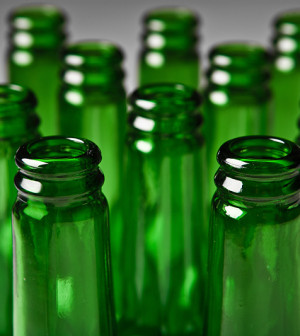- 7 Best Breads for Maintaining Stable Blood Sugar
- Gelatin vs. Collagen: Which is Best for Skin, Nails, and Joints?
- The Long-Term Effects of Daily Turmeric Supplements on Liver Health
- Could Your Grocery Store Meat Be Causing Recurring UTIs?
- Are You Making This Expensive Thermostat Error This Winter?
- Recognizing the Signs of Hypothyroidism
- 10 Strategies to Overcome Insomnia
- Could Artificial Sweeteners Be Aging the Brain Faster?
- Techniques for Soothing Your Nervous System
- Does the Water in Your House Smell Funny? Here’s Why
Strong Verbal Skills in Childhood May Raise Drinking Risk, Study Suggests


THURSDAY, Sept. 12Teens and young adults who had high levels of language development during childhood drink and get drunk more often than others their age, and the influence of friends may be a major factor, a new study suggests.
Researchers looked at data collected from twins in Finland when they were children, teens and young adults. The data collected included information from parents about the twins’ ages when they started speaking words, learning to read and using expressive language skills in school. The twins provided information on drinking, intoxication and alcohol-related problems when they were teens and young adults.
The study was published online Sept. 12 in the journal Alcoholism: Clinical & Experimental Research.
“We found that differences in language development in early childhood and school age predict alcohol-use behaviors in adolescence and up to young adulthood,” study corresponding author Antti Latvala, a post-doctoral researcher at the University of Helsinki, said in a journal news release.
“Specifically, we found that better childhood verbal development — as indicated by an earlier age of speaking words, learning to read earlier or having better expressive language skills in school age — was often predictive of a higher likelihood of engaging in more frequent drinking and intoxicating across adolescence,” Latvala said.
The more verbally advanced twins were more likely to have friends who drank in adolescence, and they also reported higher values for the temperament trait “sensation seeking,” Latvala said. “Peer associations and the tendency to seek novel experiences may in part explain the link between better language skills and engaging in drinking behaviors,” he added.
“It is important to realize that experimenting with alcohol and drinking to intoxication — although illegal and not without risks — is very common among adolescents and can be regarded as normative behavior in many countries,” Latvala said.
This is not to say, however, that highly verbal children will go on to abuse alcohol. Although teens with good language may experiment with drinking earlier than their peers, better verbal and intellectual abilities also have been found to be protective against developing severe problems with alcohol and other substances in adulthood, he said.
A U.S. public health expert welcomed the new research. “These findings are of importance for identifying the roles of childhood cognitive and intellectual factors as predictors of subsequent alcohol-use behaviors to complement the larger literature on the consequences of alcohol use and abuse on cognitive and neuropsychological functioning in adulthood,” Michael Windle, professor and chairman of the Rollins School of Public Health at Emory University, said in the news release.
More information
The U.S. National Institute on Alcohol Abuse and Alcoholism urges parents to talk to their teens about drinking.
Source: HealthDay
Copyright © 2026 HealthDay. All rights reserved.










